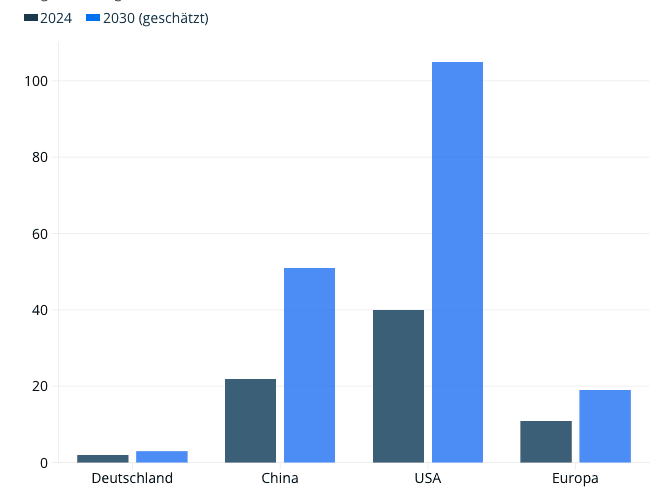
Germany is investing billions in AI - but who is making a profit?
The AI Investment Paradox: Germany Bets Big on a Technology Still Searching for Profit
Artificial intelligence has become the darling of government budgets and corporate boardrooms alike, attracting unprecedented levels of investment. Yet beneath the hype and massive capital injections lies an uncomfortable truth: AI remains fundamentally unprofitable.
A Spending Surge Without Returns
This year alone, Germany has committed €1.6 billion to artificial intelligence development—more than virtually any other technology in the federal budget. This figure represents a staggering transformation: since 2017, the Federal Ministry of Research, Technology and Space has increased its annual AI budget more than twenty-fold as part of its comprehensive AI action plan. The private sector mirrors this enthusiasm. According to research from the digital association Bitkom, approximately 60% of German companies plan to maintain or exceed their 2024 AI investment levels, with nearly a quarter preparing to significantly increase their spending on digital tools. But Rainer Rehak, a digitalisation and sustainability researcher at the Weizenbaum Institute, offers a sobering assessment: "There is currently no business model for AI." The Investment Game
From tech giants like Google, Microsoft, and OpenAI down to smaller players, AI remains purely speculative—a high-stakes investment game with no proven returns. "It's all investment money," Rehak explains. "They're spending billions and trying to push AI into the market at every turn because they hope that there will be a return on investment at some point. But that doesn't exist at the moment, not anywhere." The researcher emphasizes that a genuine "use case" only emerges when companies generate actual profits and measurable financial benefits from their AI applications. Without this critical milestone, he warns, "all these investments will eventually collapse."
Is the Bubble About to Burst?
Industry analysts are increasingly asking the uncomfortable question: Is AI becoming a bubble on the verge of bursting? Even Sam Altman, CEO of OpenAI (the company behind ChatGPT), has expressed skepticism about the sustainability of massive AI spending, reportedly warning that the artificial intelligence market is taking on bubble-like characteristics.
This growing concern reflects a broader anxiety that AI investment is accelerating faster than practical applications and revenue models can develop.
Germany's Digital Ambition

The new German government has set an ambitious goal in its coalition agreement: strengthening Germany's position as a data center hub and European technology leader. "Germany was once a leader in AI research and among the first to publish a national AI strategy," notes Dr. Ralf Wintergerst, president of Bitkom. "But now we're lagging behind the US, especially in the field of generative AI." Generative AI—which creates new content rather than simply analyzing existing data—demands substantial computational resources. These requests are processed in high-performance data centers, and according to an eco Internet Industry Association study, Germany faces a critical shortage.
The Computing Power Gap
The numbers paint a stark picture. Germany's computing capacity could potentially reach 3.7 gigawatts by 2030—a 50% increase over five years. However, industrial demand is projected to be three to five times higher, potentially requiring up to 12 gigawatts of power (equivalent to at least ten nuclear reactors). The United States currently possesses 20 times Germany's computing capacity, with projections showing even faster American growth through 2030. Consulting firm Deloitte warns that at current expansion rates, Germany will face a 50% capacity gap by 2030, necessitating "massive additional investments."
A Different Path Forward
Professor Oliver Thomas of Osnabrück University and founder of Strategion GmbH offers an alternative perspective. While acknowledging that Europe is "paying today for the IT gigantism of the 1990s and 2000s," he argues that some businesses are already extracting value from AI, even as large model providers struggle with monetization. Thomas advocates for a fundamentally different approach: "We have to be faster. Research and development, implementation, and commercialization must take place in parallel" rather than sequentially. He envisions AI's true potential being realized not through competing with US tech giants, but by deploying it strategically: "AI now has to go where it belongs, namely where our appreciation takes place in Germany: among SMEs and hidden champions"—the relatively unknown larger companies that dominate their specialized sectors. Bridging Research and Reality
Thomas also challenges policymakers to rethink their approach. While supporting the fundamentals of Germany's AI action plan, he insists that "researchers, universities, and institutions must take more responsibility for ensuring that knowledge transfer works." The path to profitability, he argues, requires moving beyond theoretical research—the traditional focus of federal AI funding—toward direct practical application. The bottom line: Germany stands at a crossroads, having committed billions to a technology that has yet to prove its business case. Whether these investments will yield the anticipated returns or become a cautionary tale about speculative excess remains to be seen.
The AI revolution may be inevitable, but the timeline to profitability remains uncertain. As investment continues to surge, the pressure mounts to transform potential into profit—before the bubble bursts.
 Career & Business
Career & Business Pfizer agrees to lower prescription drug costs for Medicaid
Under the deal, New York-based Pfizer will charge most-favoured-nation pricing to Medicaid and guara...
 Tech & Innovation
Tech & Innovation Most people are trying AI assistants—but few rely on them for high-stakes advice
Posted on 2025-10-03
A growing share of consumers are testing AI assistants for everyday tasks. But most still hesitate t...